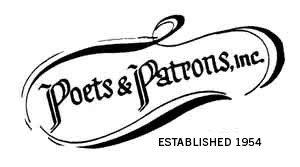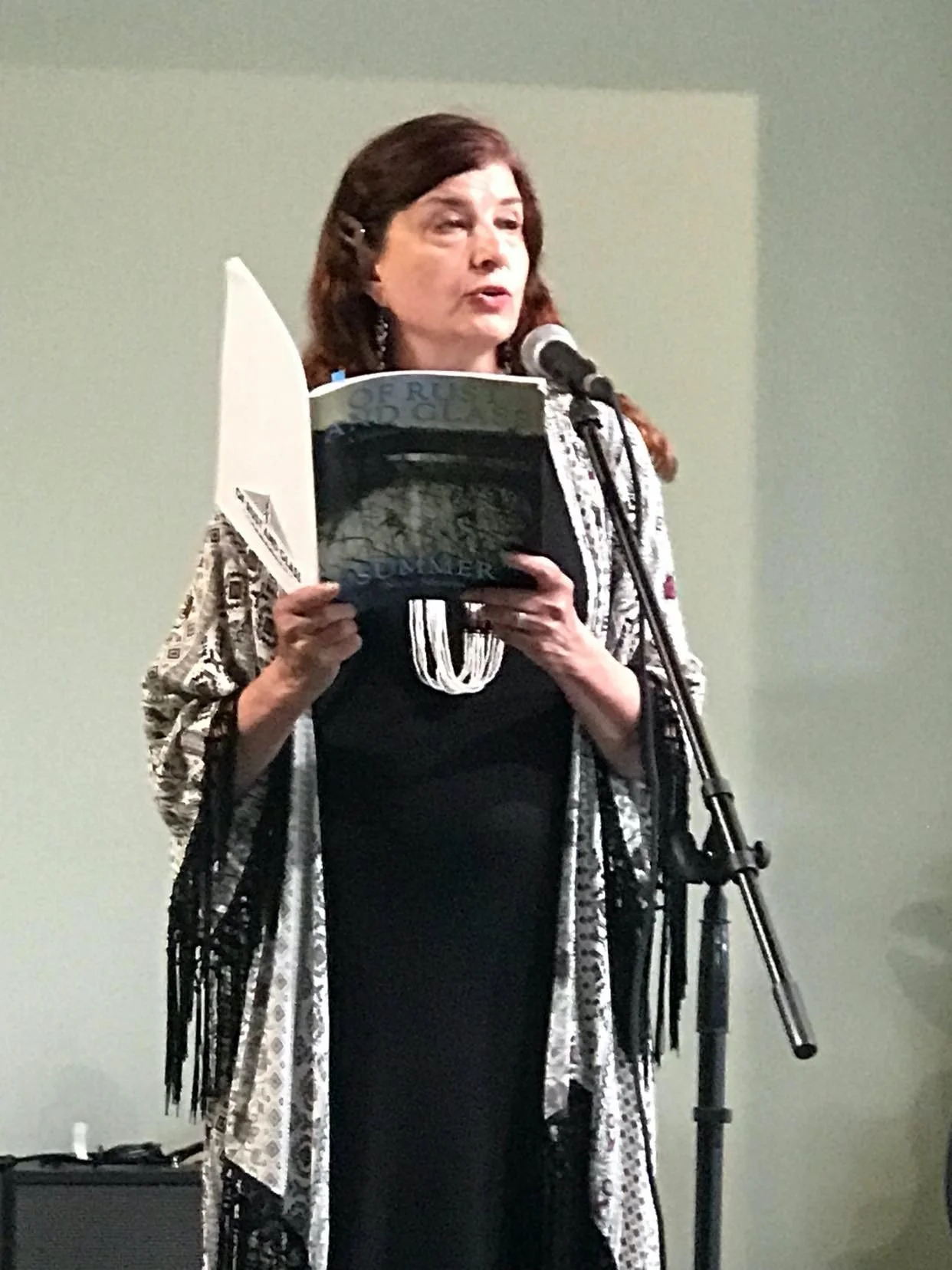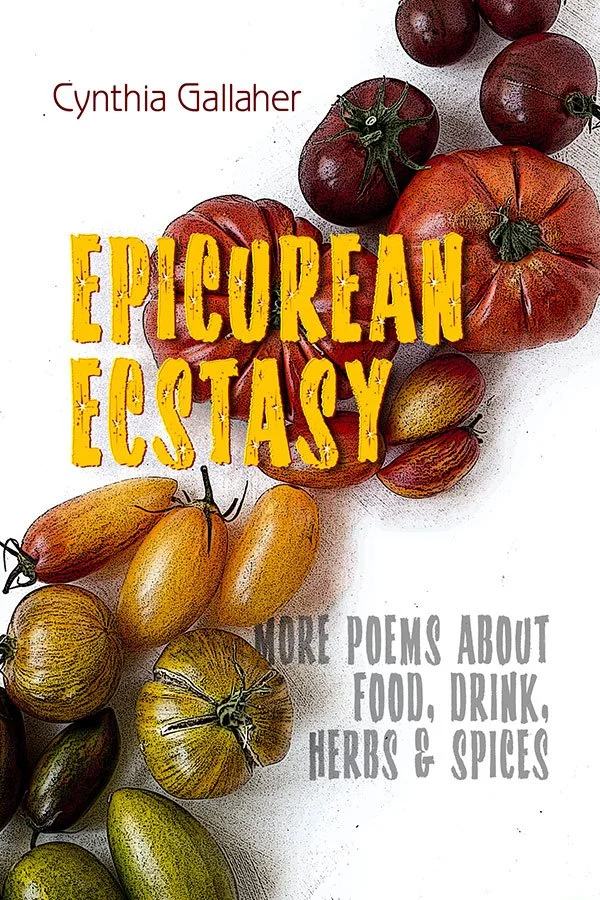Member Spotlight:
Cynthia Gallaher
Cynthia Gallaher is a Chicago USA-based poet, and author of four collections of poetry and three chapbooks, many with themes, such as Epicurean Ecstasy: More Poems About Food, Drink, Herbs & Spices and her poetry chapbook on liquids, Drenched. Her nonfiction memoir/reference/creativity guide Frugal Poets’ Guide to Life: How to Live a Poetic Life, Even If You Aren’t a Poet won a National Indie Excellence Award.
Besides the United States & Canada, her poetry has appeared in publications from England, Scotland, Netherlands, Sweden, Eastern Europe, India, Japan, China, Hong Kong & New Zealand.
Greek to Me
by Cynthia Gallaher
It’s a cyrillic head dance,
alphas, epsilons,
thetas and theophany.
Spanish language radio drifts through stained glass,
students comprehend every fifth palabra
and forget what language to daydream in.
Sentences skirt along flamenco-ruffled rhythms,
each spicy companion cradles a different phraseology in one hand,
while a bilingual dictionary rests unopened in the other.
Snow clouds powder encryptions on outdoor icons,
post-Delphic messages
lie scrambled under drifts.
Latin mass memories recycle, Dominus vobiscum,
an asymmetrical song and a metered click from an incense burner
cleave music and aroma to multi-tongued crowds of the past.
Where are the Polish grandmas who grasped rosaries, whispered prayers,
“Peash, pa-peash, peash,” in the pews behind me. “Brakuje mi ciebie.”
Shushed soundtracks of three-day wakes.
Fast forward, the Greek priest blesses another funeral
making the sign of the cross opposite of Jesuits,
Parakletos hovers 40 days after death
before the dearly’s heavenly departure: A queue forms.
The Greek priest spoon feeds wine to the chatty and taciturn alike,
a redemptive alphabet soup bears a celestial lexicon,
each mouth forms
a silent omega.
Glossary
Theophany (Greek): The baptism of Christ; a Christ vision
Palabras (Spanish): words
Dominus vobiscum (Latin): The Lord be with you
Brakuje mi ciebie (Polish): I miss you–(brach mee chevie-yah)
Parakletos (Greek): The Holy Spirit
When did you first start writing poetry?
My first poetry reading was at my eighth-grade graduation ceremony. The teachers asked me to write a poem thanking my parents, and I read it aloud to the audience. I didn’t think much about it at the time. But I later started writing poems in high school, after a friend introduced me to the work of Allen Ginsberg and Andrei Codrescu. I got serious about poetry only after college, becoming a regular part of the Chicago poetry scene on Lincoln Avenue, which was then the place to be. I talk about those early days in my memoir/creativity guide Frugal Poets’ Guide to Life: How to Live a Poetic Life, Even If You Aren’t a Poet.
What inspires you? Other poets, painting? Music?
I have diverse interests, as do many people. But I’m glad I can also translate those interests into poems. In addition to being a poet, I’m also an avid swimmer, a yoga instructor, a certified aromatherapist, lover of various kinds of music, and a former fashion copywriter. So I’ve written a number of poems about swimming and water, fashion, music, essential oils, and art, among other topics. I hold a degree in the History of Art and Architecture (not English, by the way, though I completed a number of courses in that subject, including a poetry writing class with poet Michael Anania, and a workshop with the late poet Larry Levis) and just finished a manuscript of ekphrastic poems. Read more ⟶
What inspires you? Other poets, painting? Music?
I’m also a home cook, recipe collector and nutrition advocate, and was once a board member for the activist group Illinois Coalition for Safe Food, so that explains my food poems. Spiritually, I’m a Christian, and have enjoyed writing poems lately about the many unsung women heroes in the Bible.
In essence, I’m all for writing poems about “what you know,” but also about researching and writing about “what you WANT to know about.” The subject matter for poems is endless! And at the feet of each and every poet.
Where have you published?
Four of my full collections have been published: Night Ribbons, Swimmer’s Prayer, Earth Elegance (poems about animals), and Epicurean Ecstasy: More Poems About Food, Drink, Herbs & Spices. Also three chapbooks: Private, On Purpose, Omnivore Odes: Poems About Food, Herbs & Spices, and Drenched (poems about water and other liquids). In addition, as mentioned above, there’s my memoir/creativity guide/history of the Chicago poetry scene/and reference Frugal Poets’ Guide to Life, How to Live a Poetic Life, Even If You Aren’t a Poet.
It takes time and work. Each completed poem is a reward. Every poet needs to put their heart into it. Just so you know, it took about 15 years after I started writing poetry seriously to come out with my first book. It’s natural that any poet would eventually like to see his or her first book published, but may not have as yet. It’s important to know that you first need to get individual poems published in literary journals and anthologies before you really think of putting a book together. Be prepared to be thick-skinned about submitting to journals, as you will likely get more rejections than acceptances. Don’t take rejection personally, as many (not all) journals are flooded with submissions, have only so much space, and each editor has a subjective taste in poetry. Keep trying. Book publishers want to see your track record, and you should have one. And it’s probably a good idea to try to come out with a chapbook before you publish a full collection. Publishers are more likely to publish a chapbook for a newer or under-published poet than a full collection, because it’s less of a financial risk. Of course, self-publishing is an option that’s more popular today than ever.
How long might you struggle with a poem that doesn’t seem to want to come together?
Some poems flow out easily in one fell swoop, but that’s an exception. I usually tinker with a new poem for a few days until it’s to my liking. If it’s just not going anywhere, I put it away, sometimes for a few months, and revisit it later with fresh eyes. The draft might bear the seed of what I want to get across, but it may need to be expressed in another way. And often putting it aside can allow that process to gel.
I find it kind of amateurish when a poet reads a poem at an open mic, let’s say, that he or she just wrote that same day and is overly excited about. Most likely, it still needs work. And please try not to send freshly born poems out for publication. Take some time to make sure you are happy with your opening, images and ending. Then put yourself in the position of the reader’s perspective. Will the poem come across the same way for them? What’s unclear, masked, or overly personal? Are you saying too much…or too little?
Rather recently, I found a typewritten poem in my file cabinet from several decades ago that I had forgotten about and had never published. I reworked it, sent it to a literary magazine, and it got published! So what was old to me, is now new to others. Why not, especially if such poems don’t have topical references, locking them in a certain era.



